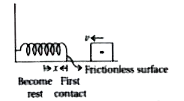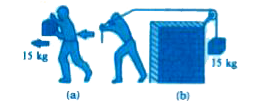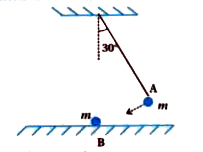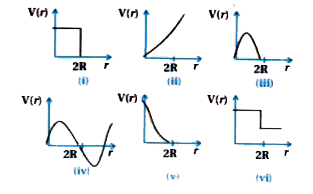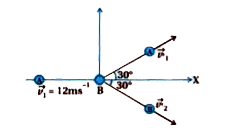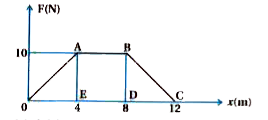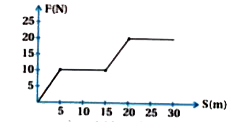SECTION - B Numericals (Numerical From Textual Illustration) from KUMAR PRAKASHAN KENDRA PHYSICS (GUJRATI ENGLISH) WORK, ENERGY AND POWER for Class 11
| Class 11 | PHYSICS |
| Chapter | WORK, ENERGY AND POWER |
| KUMAR PRAKASHAN KENDRA PHYSICS (GUJRATI ENGLISH) | SECTION - B Numericals (Numerical From Textual Illustration) |
| Medium | English |
| Academic Year | 2023-2024 |
Question 2
It is well known that a raindrop falls under the influence of the downward gravitational force and the opposing resistive force. The latter is known to be proportional to the speed of the drop but is otherwise undetermined.Consider a drop of mass 1.00 g falling from a hwight 1.00 km .It hits the ground with a speed of 50.0ms−1 (a) What is the work done gravitational force ? (b) What is the work done by the unknown resistive force ?View SolutionQuestion 5
A woman pushes a trunk on a railway platform which has a rough surface . She applies a force of 100 N over a distance of 10 m . Thereafter ,she gets progressively tired and her applied force reduces linearly with distance to 50 N . The total distance through which the trunk has been moved is 20 m . Plot the force applied by the woman and the frictional force , which is 50 N versus dispalcement Calculate the work done by the two forces over 20 m .View SolutionQuestion 6
A block of mass m = 1 kg , moving on a horizontal surface with speed vi=2ms−1 enters a rough patch ranging from vi=2ms−1 enters a rough patch ranging from x=0.10 m to x=2.01 m The retarding force Fr on the block in this rangeis inversely proportional to x over this range ,
Fr=−kxfor 0.1<x<2.01m=0 for x<0.1mandx>2.01 where k 0.5 J .What is the final kinetic energy and speed vf of the block as it crosses this patch ?View SolutionQuestion 7
A bob of mass m is suspeded by a light string of length L . It is imparted a horizontal velocity v0 at the lowest point A such that it completes a semicircular trajectroy in the vertical plane with the string becoming slack only on reaching the topmost point C . Thisis shown in figure .Obtain a expression for (i) v0 (ii) the ratio of the kinetic energies (KBKC) at B and C . Comment on the nature of the trajectroy of the bob after it reaches the point C .
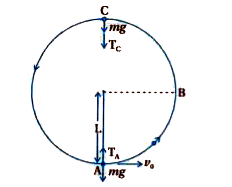 View Solution
View SolutionQuestion 8
To simulate car accidents , auto manufactures study the collisions of moving cars with mounted springs of different spring constants. Consider a typical simulation with a car of mass 1000 kg moving with a speed 18.0 km/h on a smooth road and colliding with a horizontally mounted spring of spring constant 6.25×103Nm−1 .What is the maximum compression of the spring ?View SolutionQuestion 12
In a nuclear reactor a neutron of high speed (typically 107ms−1) must be slowed to of interacting with isotope .23592U and causing it to fission . Show that a neutron can lose most of its kinetic energy in an elastic collision with a light nuclei like deuterium or carbon which has a mass of only a few times the neutron mass . the material making up the light nuclei , usually heavy water (D2O) or graphite is called a moderator . View SolutionQuestion 13
Consider the collision depicted in figure to be between two billiard balls are equal masses m1=m2 . The first ball is called the cue while the second ball is called the target . The billiard player wants to 'sink ' the target ball in a corner pocket , which is at angle θ2=37∘ .Assume that the collision is elastic and that friction and rotational motion are not important . Obtain θ1 .
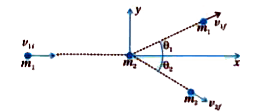 View Solution
View SolutionQuestion 16
It is well known that a raindrop falls under the influence of the downward gravitational force and the opposing resistive force. The latter is known to be proportional to the speed of the drop but is otherwise undetermined.Consider a drop of mass 1.00 g falling from a hwight 1.00 km .It hits the ground with a speed of 50.0ms−1 (a) What is the work done gravitational force ? (b) What is the work done by the unknown resistive force ?View SolutionQuestion 19
A woman pushes a trunk on a railway platform which has a rough surface . She applies a force of 100 N over a distance of 10 m . Thereafter ,she gets progressively tired and her applied force reduces linearly with distance to 50 N . The total distance through which the trunk has been moved is 20 m . Plot the force applied by the woman and the frictional force , which is 50 N versus dispalcement Calculate the work done by the two forces over 20 m .View SolutionQuestion 20
A block of mass m = 1 kg , moving on a horizontal surface with speed vi=2ms−1 enters a rough patch ranging from vi=2ms−1 enters a rough patch ranging from x=0.10 m to x=2.01 m The retarding force Fr on the block in this rangeis inversely proportional to x over this range ,
Fr=−kxfor 0.1<x<2.01m=0 for x<0.1mandx>2.01 where k 0.5 J .What is the final kinetic energy and speed vf of the block as it crosses this patch ?View SolutionQuestion 21
To stimulate car accident , auto manufacturers study the collision of moving car with mounted springs of different spring constants . Consider a typical stimulation with a car of mass 800 kg moving with a speed 36.0 km/h on a smooth road and colliding with a horizontally mounted spring of spring constant 6.25×103Nm−1 .What is the maximum compression of the spring ? View SolutionQuestion 29
Consider the collision depicted in gif . To be between two billiard balls with equal masses second ball is called the target .The billiard player wants to 'sink' the target ball in corner pocket , what is at an angle θ2=32∘
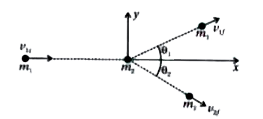
Assume that collision is elastic and that friction and rotational motion are not important Obtain θ1.View SolutionQuestion 30
The sign of work done by a force on a body is important to understand .State carefully if the following quantities are positive or negative :
(a) work done by a man in lifting a bucket out of a well by means of a rope tied to the bucket .
(b) work done by gravitational force in the above case ,
(c ) work done by friction on a body siding down an inclined plane ,
(d ) workdone by an applied force on a body moving on a rough horizontal plane woth uniform velocity .
(d) work done by the resistive force of air on a vibrating pendulum in bringing it to rest . View SolutionQuestion 31
A body of mass 2 kg initially kg intially at rest moves under the action of an applied horizontal force of 7 N on a table with coefficient of kinetic friction = 0.1 Compute the
(a) work done by the applied force in 10 s.
(b) work done by friction in 10 s .
work done by the net force on the body in 10 s.
(d) Change in kinetic energy of the body in 10 s and interpret your details .View SolutionQuestion 32
Given in figure are examples of some potential energy functions in one dimension. The total energy of the aprticle is indicated by a cross on the ordinate axis . In each case , specify the regions ,if any , in which the particle cannot be found for the given energy .Also , indicate the minimum total energy the particle must have in each case . Think of simple physical contexts for which these potential energy shapes are relvant .
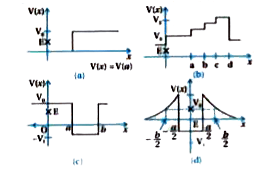 View Solution
View SolutionQuestion 33
The potential energy function for a particle executing linear simple harmonic motion is given by V(x)=kx22 where k is the force constant of the oscillator . For k=0.5Nm−1 , the graph of V(x) versus x is shown in figure . Show that a particle of total energy 1 J movng under this potential must 'turn back ' when it reaches x=±2m .
 View Solution
View SolutionQuestion 49
If the potential energy of two billiard balls depends only on the separation distance between their centres , is the collision elastic or inelastic ? ( Note , we are talking here of potential energy corresponding to the force during collision , not gravitational potential energy ).View SolutionQuestion 52
A body constrained to move along the z -axis of a coordinate system is subject to a constant force F given by →F=(−ˆi+2ˆj+3ˆk)N where ˆi,ˆj,ˆk are unit vectors along the x, y and z-axis of the system respectively . What is the work done by this force in moving the body a distance of 4 m along the z- axis?View SolutionQuestion 53
An electron and a proton are detected in a cosmic ray experiment , the first with kinetic energy 10 keV and the second with 100 keV.Which is faster , the electron or the proton ? Obtain the ratio of their speeds . (electron mass =9.11×10−31 kg , proton mass = 1.67×10−27kg,1eV=1.60×10−19J)View SolutionQuestion 54
A rain drop of radius 2 mm falls from a height of 500 m above the ground .It falls with decreasing acceleration (due to viscous resistance of the air) until at half its original height , it attains its maximum (terminal) speed, and moves with uniform speed thereafter .What is the work done by the gravitational force on the drop in the first and second half of its journey ?What is the work done by the resistive force in the entire journey if its speed on reaching the ground is 1ms−1 ?View SolutionQuestion 57
Two identical ball bearings in contact with each other and resting on a frictionless table are hit head - on by another ball bearing of the same mass moving initially with a speed V. If the collision is elastic , which of the following fgures is a possible result after collision ?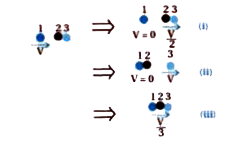 View Solution
View SolutionQuestion 59
The bob of pendulum is released from a horizontal position . If the length of the pendulum is 1.5m ,what is the speed with which the bob arrives at the speed with which the bob arrives at the lowermost point , given that it dissipated 5 % of its intial energy against air resistance ?View SolutionQuestion 60
A trolley of mass 30 kg carrying a sandbag of 25 kg is moving uniformly with a speed of 27 km/h on a frictionless track . After a while , sand starts leaking out of hole on the floor of the trolley of the rate of 0.05 kg s−1 .What is the speeed of the trolley after the entire sand bad is empty ?View SolutionQuestion 62
The blades of a windmill sweep out a circle of area A . (a) If the wind flows at a velocity v perpendicular to the circle , what is the mass of the air passing through it in time t ? (b) What is the kinetic energy of the air ? (c ) Assume that the windmill converts 25 % of the wind's energy into electrical energy , and that A = 30 m2 , v = 36 km/h and the density of air is 1.2m2 v = 36 km/h and the density of air is 1.2 kg m−3 .What is the electrical power produced ?View SolutionQuestion 63
A person trying to lose weight (dieter ) lifts a 10 kg mass , one thousand times , to a height of 0.5 m each time .Assume that the potential energy lost each time she lowers the mass is dissipated . (a) How much work does she do against the gravitational force ? (b) Fat supplies 3.8×107 J of energy per kilogram which is converted to mechanical energy with a 20 % efficiency rate . How much fat will the dieter use up ?View SolutionQuestion 65
A bullet of mass 0.012kg and horizontal speed 70ms−1 strikes a block of wood of mass 0.4kg and instantly comes to rest with respect to the block. The block is suspended from the ceiling by means of thin wires. Calculate the height to which the block rises. Also, estimate the amount of heat produced in the block.View SolutionQuestion 66
Two inclined frictionless tracks , one gradual and the other steep meet at A from where two stones are allowed to slide down from rest , one on each track as shown in figure . Will the stones reach there with the same speed ? Explain . Given θ1=30∘,θ2=60∘andh=10m What are the speeds and times taken by the two stones ?
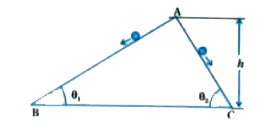 View Solution
View SolutionQuestion 67
A 1 kg block situated on a rough incline is connected to a spring constant 100Nm−1 as shown in figure . The block is released from rest with the spring in the unstretched position . The block moves 10 cm down the incline before coming to rest . Find the coefficient of friction between the block and the incline .Assume that the spring has a negligible mass and the pulley is frictionless.
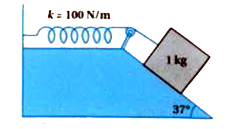 View Solution
View SolutionQuestion 68
A bolt of mass 0.3kg falls from the ceiling of an elevator moving down with an uniform speed of 7ms−1. It hits the floor of the elevator (length of the elevator = 3m) and does not rebound. What is the heat produced by the impact? Would your answer be different if the elevator were stationary?View SolutionQuestion 69
A trolley of mass 200 kg moves with a uniform speed of 36 km/h on a frictionless track. A child of mass 20 kg runs on the trolley from one end to the other (10 m away) with a speed of 4ms−1 relative to the trolley in a direction opposite to the its motion, and jumps out of the trolley. What is the final speed of the trolley? How much has the trolley moved from the time the child begins to run?View SolutionQuestion 71
Consider the decay of a free neutron at rest :
n→p+e−
Show that the two body decay of this type must necessary give an electron of fixed energy and therefore cannot account distribution in the β−decay of a neutron or a nucleous as shown in figure .
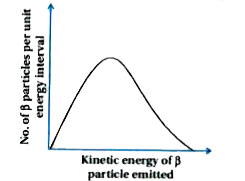
[ Note : The simple result of this exercise was one among the several arguments advanced by W . Pauli to perdict the existence of a third particle in the decay products of β− decay . This particle is known as neutrino spin 12 ( like e− p or n ) but is neutral ad either massless or having an extremely small mass (compared to the mass of electron) and which interacts very weakly with matter . The correct decay process of neutron is : n→p+e(−)+v) View SolutionQuestion 73
A body of mass 2 kg is rest on a smooth horizontal surface . When a horizontal force of 0.5 N acts on this bofy it is displaced in the direction of the force . Find the work done by the force in 8.0 s .Show that this work is equal to the change in kinetic energy of the body .View SolutionQuestion 77
A tube is fixed in a vertical plane as shown in figure .Form point A a sphere of mass 0.314 kg is released .During its motion in the tube it faces a constant resistive force R . At B its velocity becomes zero . Calculate (i) the constant resistive force R and (if) work done by resistive force (average radisu of semicircular path is 1 m ) .
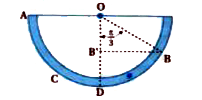 View Solution
View SolutionQuestion 78
A sphere of steel of mass 1 kg moving with a velocity of 12m/s ,along X-axis collides elastically with a stationary sphere after the collision is 8 m/s and is moving at an angle of 45∘ with X -axis , find the magnitude and direction of the second sphere after the collision .
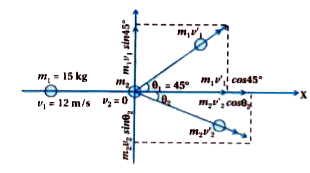 View Solution
View SolutionQuestion 79
The relation between position and time f for a particle , performing one dimensional motion is as under : t=√x+3
Here x is in metre and t is in second .
(1) Find the displacement of the particle when its velocity becomes zero .
(2) If a constant force acts on the particle , find the work done in first 6 second .View SolutionQuestion 80
A spring of force constant k is kept in the compressesd condition between two blocks masses m and M on the smooth surface of a table as shown in figure .When the spring is released , both the blocks move in opposite directions .When the spring attains the orginal (normal ) position . both blocks lose the constacts with the spring . If x is the intial compression of the spring find the speeds of block while getting detached from the spring .
 View Solution
View SolutionQuestion 81
Two beads of masses m1andm2 are closed threaded on a smooth circular loop of wire of radius R. Intially both the beads are in position A and B in vertical plane .
Now , the bead A is pushed slightly so that it slide on the wire and collides with B . if B rises to the height of the centre , the centre of the loop O on the wire and becomes stationary after the collision , prove m1:m2=1:√2
 View Solution
View Solution
All Exercises from KUMAR PRAKASHAN KENDRA PHYSICS (GUJRATI ENGLISH) Class 11 PHYSICS WORK, ENERGY AND POWER
- SECTION - A QUESTIONS - ANSWERS (INTRODUCTION)
- SECTION - A QUESTIONS - ANSWERS (TRY YOURSELF (VSQS))
- SECTION - B NUMERICALS (NUMERICAL FROM .DARPAN. BASED ON TEXTBOOK)
- SECTION - B NUMERICALS (NUMERICAL FROM TEXTUAL EXERCISE)
- SECTION - B NUMERICALS (NUMERICAL FROM TEXTUAL ILLUSTRATION)
- SECTION - C OBJECTIVE QUESTIONS (VSQS)
- SECTION - D NCERT EXEMPLAR SOLUTIONS (LONG ANSWER TYPE QUESTIONS)
- SECTION - D NCERT EXEMPLAR SOLUTIONS (MULTIPLE CHOICE QUESTIONS)
- SECTION - D NCERT EXEMPLAR SOLUTIONS (SHORT ANSWER TYPE QUESTIONS)
- SECTION - D NCERT EXEMPLAR SOLUTIONS (VERY SHORT ANSWER TYPE QUESTIONS)
- SECTION - E MULTIPLE CHOICE QUESTIONS (MCQS)
- SECTION - F QUESTIONS FROM MODULE (SAMPLE QUESTIONS FOR PREPARATION OF COMPETITIVE EXAMS)
- QUESTION PAPER (SECTION - A)
- QUESTION PAPER (SECTION - B)
- QUESTION PAPER (SECTION - C)
- QUESTION PAPER (SECTION - D)

